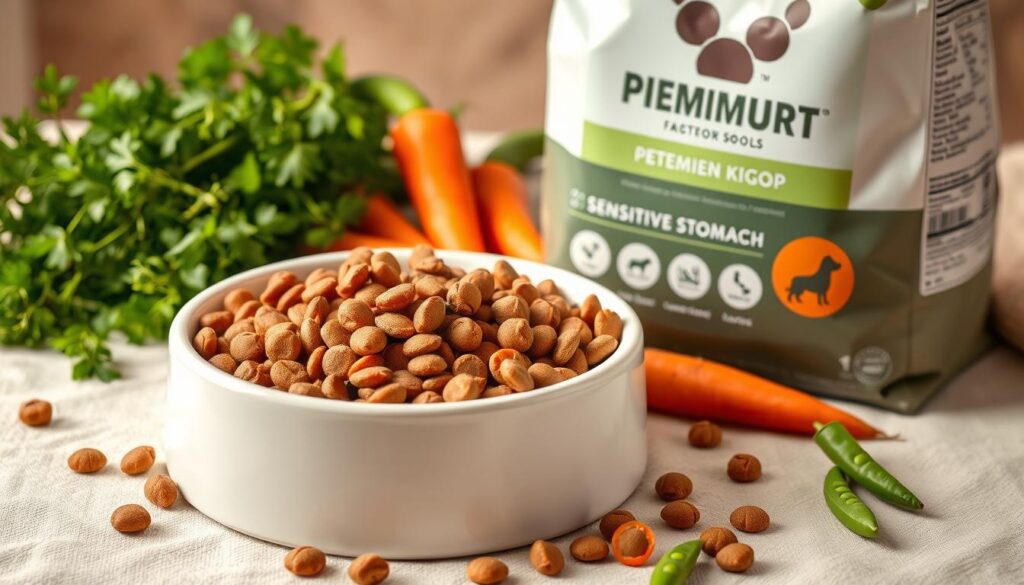Every dog owner knows the happiness that comes from seeing their furry friend thrive. However, when your loyal companion starts showing signs of discomfort after meals, that joy can quickly turn into worry.
Take, for example, a playful Labrador who seems fine during the day but suddenly suffers from vomiting and diarrhea as night falls. This distress not only affects the dog but also creates concern for the entire household.
Understanding the need for healthy dog food options for sensitive stomachs is essential. Dogs with digestive issues often require specialized diets that focus on easily digestible ingredients to prevent further discomfort.
From selecting the best dog food for sensitive stomachs to incorporating probiotics, pet owners can make informed choices. These steps play a crucial role in ensuring their dog’s overall health and happiness.
The good news is that there are numerous options available, from natural dog food for sensitive stomach to premium brands known for their quality. Recognizing the symptoms and making dietary adjustments can create a path toward a happy, healthy life for your canine companion. Consider incorporating the right nutrient-rich foods into your dog’s diet to promote their digestive wellness and enhance overall happiness.
Key Takeaways
- Recognize symptoms: Vomiting and diarrhea are common signs of a sensitive stomach in dogs.
- Choose wisely: Opt for healthy dog food options that focus on easily digestible proteins.
- Consult a vet: Work with a veterinarian to tailor a diet suited for your dog’s specific needs.
- Introduce gradually: Transition new foods over 7-10 days to minimize digestive upset.
- Incorporate probiotics: These beneficial bacteria can assist in managing gastrointestinal health.
Understanding Sensitive Stomachs in Dogs
A sensitive stomach can affect your dog’s overall well-being and quality of life. Owners often first notice symptoms of sensitive stomach in dogs that can be alarming. Recognizing these signs quickly is crucial in providing the necessary care. Symptoms include vomiting, diarrhea, excessive gas, and loss of appetite. These indicators should not be overlooked as they may indicate deeper issues.
Signs Your Dog Has a Sensitive Stomach
Common symptoms of sensitive stomach in dogs often manifest as gastrointestinal distress. Dogs may exhibit behaviors like unease, frequent bowel movements, or discomfort when eating. It’s essential to monitor these signs closely as they can lead to more severe health problems if not addressed.
Common Causes of Stomach Sensitivity
Several factors contribute to causes of sensitive stomach issues in dogs. Allergies to specific ingredients, stress, and infections can all play a role. Additionally, underlying health conditions such as pancreatitis or inflammatory bowel disease may also result in gastrointestinal sensitivity. An understanding of these factors can help in formulating an effective dietary plan for your pet.
How Diet Affects Your Dog’s Digestive Health
A dog’s diet significantly influences their digestive health. The diet’s effect on dog digestion is evident when considering how certain ingredients may upset a sensitive stomach. Foods high in fat can lead to digestive issues, while easily digestible ingredients can promote a healthier gut. Options like lean proteins and simple carbohydrates are usually better tolerated by dogs with sensitive stomachs, making them vital in preventing gastrointestinal distress.
Key Nutritional Elements for Sensitive Stomachs
Understanding the nutritional needs of dogs with sensitive stomachs can significantly enhance their overall health and comfort. Providing nutrients that are gentle on the digestive system is vital. By focusing on easily digestible dog food, pet owners can help alleviate gastrointestinal distress often seen in sensitive dogs.
Importance of Easily Digestible Ingredients
Easily digestible ingredients are crucial for dogs experiencing digestive issues. High-quality proteins, such as chicken, turkey, and fish, not only offer essential amino acids but are also gentle on the stomach. Integrating these ingredients into your dog’s diet promotes healthy digestion and minimizes discomfort.
Role of Fiber in Dog Nutrition
Fiber’s role in dog nutrition cannot be overstated. A diet enriched with appropriate fibers helps maintain regular bowel movements and supports the health of beneficial gut bacteria. Ingredients like sweet potatoes, oats, and chicory root offer prebiotic fibers that nourish good bacteria in the gut. This balance supports a robust immune system, as about 70% of a dog’s immune function is linked to gut health.
Benefits of Probiotics for Digestive Health
Probiotics for dog digestion can offer significant benefits, especially for those with sensitive stomachs. Specific strains, such as Bifidobacterium animalis and Lactobacillus acidophilus, help restore gut flora, improve nutrient absorption, and reduce gastrointestinal upset. Regular use of probiotics establishes healthy colonies in the gut, which leads to long-term digestive health improvement. The importance of nutrition in maintaining cognitive mirrors the need for balanced gut health in dogs.

Types of Healthy Dog Food Options
When selecting food for dogs with sensitive stomachs, it’s essential to focus on different dietary options that cater specifically to their needs. Choosing the right type can play a crucial role in improving their digestive health while minimizing discomfort. Three notable categories include grain-free formulas, limited ingredient diets for dogs, and high-quality protein sources.
Grain-Free Formulas
Grain-free dog food for sensitive stomach is often sought after by pet owners. These formulas typically feature more digestible proteins and fewer irritants, making them an excellent choice for dogs struggling with stomach sensitivities. Many brands offer grain-free options that maintain balanced nutrition without the common allergens found in grains.
Limited Ingredient Diets
Limited ingredient diets for dogs simplify the nutritional profile by focusing on a few key ingredients. This approach helps reduce the risk of adverse reactions, particularly for pups with food sensitivities. By limiting the number of ingredients, owners can better identify what works best for their dog’s digestive system, ultimately promoting better gut health.
High-Quality Protein Sources
High-quality protein for sensitive dogs is vital for maintaining overall health. Ingredients such as novel proteins like salmon or venison offer excellent sources of nutrition while being gentle on the stomach. Opting for dog foods that highlight these premium ingredients ensures that dogs receive the essential nutrients they need without triggering discomfort.
As pet owners explore various food options, it’s helpful to consider animal health and dietary preferences. For those searching for more information on suitable destinations for adventure, check out this engaging article on best vacation spots and places to.
Recommended Brands for Sensitive Stomachs
Choosing the right food for dogs with sensitive stomachs is crucial for optimal health. Various sensitive stomach dog food brands excel in this area, offering specially formulated recipes that prioritize gentle digestion and overall well-being. The following brands stand out among vet recommended dog food for sensitive stomachs, providing options that cater to nutritional needs without compromising taste.
Wellness CORE Digestive Health
Wellness CORE Digestive Health focuses on high-quality, easily digestible ingredients complemented by prebiotics. This formula supports a balanced digestive system, making it one of the top sensitive stomach dog food brands. Many pet owners appreciate the holistic approach, which nurtures both digestive and overall health.
Hill’s Science Diet Sensitive Stomach & Skin
Hill’s Science Diet Sensitive Stomach & Skin is formulated with highly digestible components that promote better gastrointestinal health. With ingredients that provide critical nutrients for skin and coat conditions, this vet recommended dog food for sensitive stomachs has earned a trusted reputation among pet veterinarians. Various package sizes are available, making it convenient for all dog owners.
Blue Buffalo Basics
Blue Buffalo Basics offers limited ingredient diets that are particularly beneficial for dogs prone to food sensitivities. The focus on high-quality protein sources supports better digestion and helps avoid common allergens, aligning with the needs of dogs with sensitive stomachs. Many pet owners have found this brand to be an effective option for maintaining their dog’s overall health.

When searching for dog food solutions, consider these brands for their high-quality ingredients and vet-backed formulations. Choosing the right food is essential for both digestive health and preventing potential flare-ups linked to sensitivities. For more information on a healthy approach to meal preparation, take a look at these breakfast recipes that emphasize nutrition and balance in diet.
Homemade Dog Food Recipes
Many pet owners choose to create homemade dog food for sensitive stomachs to ensure their furry friends receive wholesome nutrition without harmful additives. Simple recipes, carefully crafted with quality ingredients, can significantly impact your dog’s digestive health. Understanding which dog food ingredients to avoid is essential for maintaining a balanced diet while preparing meals at home.
Simple Recipes for Sensitive Stomachs
One popular homemade dog food recipe consists of 2 pounds of uncooked brown rice, 6 eggs, 1-2 cups of sunflower oil, salt, 2 cans of string beans, 1 pound of carrots, and 6 pounds of boneless, skinless chicken breast. Optionally, you may include 1-2 pounds of yams and add 1-2 cans of pumpkin or offal for enhanced nutrition. This recipe yields enough food for approximately three weeks if exclusively served as homemade meals, or five to six weeks when mixed with kibble. Cooking time is around 90 minutes, allowing you to prepare a wholesome meal without too much hassle.
Ingredients to Avoid
When creating homemade dog food, certain dog food ingredients to avoid are crucial. Stay clear of artificial additives, high-fat components, and common allergens like dairy and grains that can trigger digestive issues in sensitive dogs. Those with food allergies — affecting about 8% of dogs based on the American Kennel Club — should particularly be cautious. Focus on using single protein sources such as turkey or fish to promote easier digestion.
Portion Sizes and Nutritional Balance
Balancing homemade dog food involves careful consideration of portion sizes based on your dog’s weight and nutritional needs. The food amount might appear large; therefore, dividing the meals into batches makes it much easier to mix and store, with each batch lasting about five days when frozen. Note that introducing new ingredients gradually allows the dog’s digestive system to adjust, helping to monitor any potential issues. Incorporating probiotics or digestive enzyme supplements can also support gut health in dogs with sensitive digestion, ensuring they obtain the right nutrients effectively.
Transitioning to New Dog Food
Changing your dog’s food requires careful planning to ensure their digestive system can adapt smoothly to the new ingredients. Following some effective transitioning dog food tips can significantly minimize any potential upset. Begin the transition by gradually mixing the new food with the existing one over a period of 7 to 10 days.
Steps for a Smooth Transition
Start by incorporating a small amount of the new food with the old food, gradually increasing the proportion of the new food each day. This method allows your dog’s digestive tract time to adjust. Slow transitions tend to help reduce the likelihood of gastrointestinal issues such as loose stools or gas. For some dogs, especially those sensitive to dietary changes, a transition time of longer than a week may be preferable.
Monitoring Your Dog’s Response
Throughout the transition, pay close attention to how your dog reacts to the new food. Monitoring dog food response is crucial, as changes in appetite, stool consistency, or behavior may indicate intolerance or allergies to certain ingredients. Keeping a close watch will help you quickly identify any concerns that may arise.
When to Consult Your Vet
If you notice ongoing symptoms such as vomiting, diarrhea, or lack of appetite, it may be time to consult veterinarian for dog food change. A veterinarian can provide guidance tailored to your dog’s specific health needs and help troubleshoot any transition problems. In some cases, an immediate food switch may be necessary for medical reasons, emphasizing the importance of professional advice.

Special Considerations for Puppies
Puppies, like adult dogs, can experience sensitive stomachs that affect their overall health. Addressing their puppy nutritional needs is essential for promoting growth and development while avoiding gastrointestinal issues. Careful selection of ingredients plays a crucial role in ensuring optimal digestion.
Nutritional Needs for Sensitive Stomachs
Meeting the specific puppy nutritional needs involves providing highly digestible protein sources and vital nutrients that support healthy growth. Fresh ingredients, such as well-cooked meats, should form the foundation of a balanced diet. Animal proteins like chicken, lamb, turkey, or salmon can significantly reduce digestive sensitivity and promote better health.
Choosing Puppy-Safe Ingredients
Choosing the right puppy food for sensitive stomachs means opting for high-quality, easily digestible ingredients. Grain-free, limited-ingredient options can minimize the risk of allergies and digestive disturbances. Avoiding harsh additives and focusing on fresh, wholesome ingredients helps maintain a balanced and healthy diet for your growing puppy.
Signs of Sensitivity in Young Dogs
Recognizing the signs of digestive sensitivity in puppies is crucial for timely intervention. Symptoms such as loose stools, bloating, or excessive gas indicate a potential issue with their diet. Monitoring these signs can help pet owners make necessary dietary adjustments, ensuring their puppy stays healthy and comfortable.
Frequently Asked Questions About Sensitive Stomachs
Navigating the world of dog food for sensitive stomachs can be overwhelming for many pet owners. A crucial step in diagnosing food issues in dogs involves observing changes in behavior or digestive health after meals. Common signs might include vomiting, diarrhea, or changes in appetite. By keeping a food diary and noting any patterns, you can get a clearer picture of what your dog can handle.
How can I tell if my dog’s food is causing issues?
Identifying specific ingredients can help in managing your dog’s digestive health. The best ingredients for sensitive stomach dog food typically feature highly digestible proteins such as turkey or lamb and are free from common allergens like chicken or beef. This approach minimizes the risk of adverse reactions and supports overall well-being. Additionally, incorporating probiotics can further aid digestion and balance the gut flora.
Are there specific ingredients that are better for sensitive stomachs?
When it comes to mixing dog foods safely, it’s essential to proceed with caution. A sudden change in diet can exacerbate sensitivity, so any mixing should be gradual and watched closely for negative reactions. It’s often recommended to introduce a new food over 7 to 10 days, gradually increasing the new food’s proportion while decreasing the old. This patient transition allows the digestive system to adjust without further complications.











